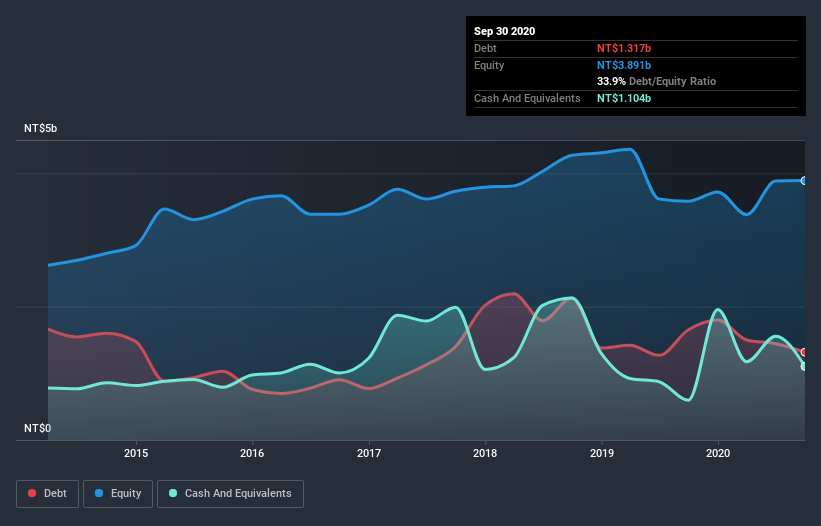Warren Buffett famously said, 'Volatility is far from synonymous with risk.' It's only natural to consider a company's balance sheet when you examine how risky it is, since debt is often involved when a business collapses. We can see that Tyntek Corporation (TPE:2426) does use debt in its business. But the real question is whether this debt is making the company risky.
When Is Debt A Problem?
Debt and other liabilities become risky for a business when it cannot easily fulfill those obligations, either with free cash flow or by raising capital at an attractive price. Part and parcel of capitalism is the process of 'creative destruction' where failed businesses are mercilessly liquidated by their bankers. However, a more usual (but still expensive) situation is where a company must dilute shareholders at a cheap share price simply to get debt under control. Of course, the upside of debt is that it often represents cheap capital, especially when it replaces dilution in a company with the ability to reinvest at high rates of return. When we think about a company's use of debt, we first look at cash and debt together.
View our latest analysis for Tyntek
What Is Tyntek's Net Debt?
The image below, which you can click on for greater detail, shows that Tyntek had debt of NT$1.32b at the end of September 2020, a reduction from NT$1.65b over a year. However, because it has a cash reserve of NT$1.10b, its net debt is less, at about NT$213.5m.

How Healthy Is Tyntek's Balance Sheet?
The latest balance sheet data shows that Tyntek had liabilities of NT$1.18b due within a year, and liabilities of NT$894.0m falling due after that. Offsetting these obligations, it had cash of NT$1.10b as well as receivables valued at NT$931.8m due within 12 months. So these liquid assets roughly match the total liabilities.
Having regard to Tyntek's size, it seems that its liquid assets are well balanced with its total liabilities. So it's very unlikely that the NT$5.62b company is short on cash, but still worth keeping an eye on the balance sheet. When analysing debt levels, the balance sheet is the obvious place to start. But it is Tyntek's earnings that will influence how the balance sheet holds up in the future. So when considering debt, it's definitely worth looking at the earnings trend. Click here for an interactive snapshot.
Over 12 months, Tyntek made a loss at the EBIT level, and saw its revenue drop to NT$2.4b, which is a fall of 4.3%. We would much prefer see growth.
Caveat Emptor
Importantly, Tyntek had an earnings before interest and tax (EBIT) loss over the last year. To be specific the EBIT loss came in at NT$41m. When we look at that and recall the liabilities on its balance sheet, relative to cash, it seems unwise to us for the company to have any debt. Quite frankly we think the balance sheet is far from match-fit, although it could be improved with time. On the bright side, we note that trailing twelve month EBIT is worse than the free cash flow of NT$98m and the profit of NT$402m. So if we focus on those metrics there seems to be a chance the company will manage its debt without much trouble. There's no doubt that we learn most about debt from the balance sheet. But ultimately, every company can contain risks that exist outside of the balance sheet. We've identified 1 warning sign with Tyntek , and understanding them should be part of your investment process.
When all is said and done, sometimes its easier to focus on companies that don't even need debt. Readers can access a list of growth stocks with zero net debt 100% free, right now.
When trading Tyntek or any other investment, use the platform considered by many to be the Professional's Gateway to the Worlds Market, Interactive Brokers. You get the lowest-cost* trading on stocks, options, futures, forex, bonds and funds worldwide from a single integrated account. Promoted
Valuation is complex, but we're here to simplify it.
Discover if Tyntek might be undervalued or overvalued with our detailed analysis, featuring fair value estimates, potential risks, dividends, insider trades, and its financial condition.
Access Free AnalysisThis article by Simply Wall St is general in nature. It does not constitute a recommendation to buy or sell any stock, and does not take account of your objectives, or your financial situation. We aim to bring you long-term focused analysis driven by fundamental data. Note that our analysis may not factor in the latest price-sensitive company announcements or qualitative material. Simply Wall St has no position in any stocks mentioned.
*Interactive Brokers Rated Lowest Cost Broker by StockBrokers.com Annual Online Review 2020
Have feedback on this article? Concerned about the content? Get in touch with us directly. Alternatively, email editorial-team (at) simplywallst.com.
About TWSE:2426
Excellent balance sheet and overvalued.
Similar Companies
Market Insights
Community Narratives



